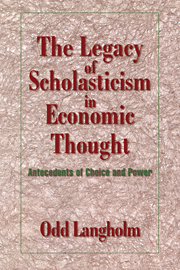Book contents
- Frontmatter
- Contents
- Preface
- Introduction
- I COMPULSION AND THE WILL: THREE ANCIENT TRADITIONS
- II NEED AS COMPULSION: THE SCHOLASTIC PARADIGM
- 4 Loans and usury
- 5 Price and market manipulation
- 6 Need and the will in buying and selling
- 7 Labor and wages
- III REJECTION AND REVIVAL IN POSTSCHOLASTIC THOUGHT
- Bibliography
- Index
4 - Loans and usury
Published online by Cambridge University Press: 13 March 2010
- Frontmatter
- Contents
- Preface
- Introduction
- I COMPULSION AND THE WILL: THREE ANCIENT TRADITIONS
- II NEED AS COMPULSION: THE SCHOLASTIC PARADIGM
- 4 Loans and usury
- 5 Price and market manipulation
- 6 Need and the will in buying and selling
- 7 Labor and wages
- III REJECTION AND REVIVAL IN POSTSCHOLASTIC THOUGHT
- Bibliography
- Index
Summary
Usury as robbery
It is one of the ironies of capitalism in a Christian world that the city of Milan, a commercial and financial center in the homeland of the Church, should claim as its patron saint the man who said that usury is robbery. In De bono mortis of St. Ambrose, the following plain statement occurs: “If someone takes usury, he commits robbery, he shall not live.” The final clause provides a certain scriptural authority for Ambrose and for the numerous theologians and canonists who quoted him on usury. The statement is not to be found in one of his sermons against economic misdeeds, but in a chapter on the eternal felicity that awaits the virtuous. The reference is to Ezekiel: “If a man be just, and [among numerous other sins listed] … hath not given forth upon usury, … he shall surely live, saith the Lord God. If he beget a son that is a robber, a shedder of blood, and … hath oppressed the poor and needy, hath spoiled by violence, … hath given forth upon usury, … he shall surely die….“
There is thus a collocation of usury and robbery in the Biblical source, but no textual basis for an identification. Prominent patristic authority, however, was almost as strong as Old Testament authority. From a certain point of view, it might even be stronger. It is difficult to imagine a more effective human weapon in the medieval campaign against usury than St. Ambrose's definition of usury as robbery.
- Type
- Chapter
- Information
- The Legacy of Scholasticism in Economic ThoughtAntecedents of Choice and Power, pp. 59 - 76Publisher: Cambridge University PressPrint publication year: 1998

